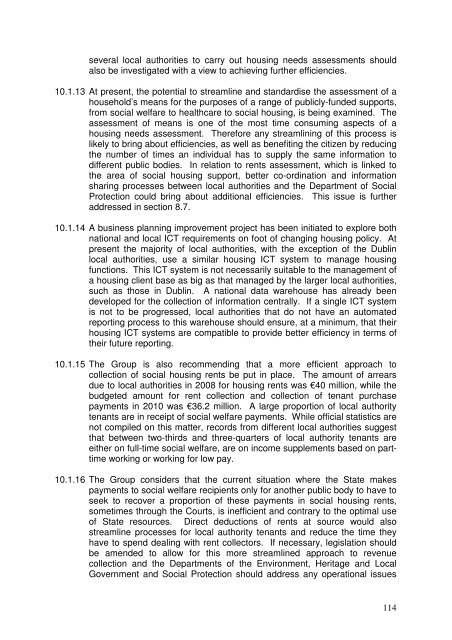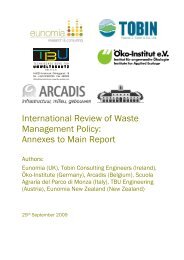Report of the Local Government Efficiency Review Group
Report of the Local Government Efficiency Review Group
Report of the Local Government Efficiency Review Group
Create successful ePaper yourself
Turn your PDF publications into a flip-book with our unique Google optimized e-Paper software.
several local authorities to carry out housing needs assessments should<br />
also be investigated with a view to achieving fur<strong>the</strong>r efficiencies.<br />
10.1.13 At present, <strong>the</strong> potential to streamline and standardise <strong>the</strong> assessment <strong>of</strong> a<br />
household’s means for <strong>the</strong> purposes <strong>of</strong> a range <strong>of</strong> publicly-funded supports,<br />
from social welfare to healthcare to social housing, is being examined. The<br />
assessment <strong>of</strong> means is one <strong>of</strong> <strong>the</strong> most time consuming aspects <strong>of</strong> a<br />
housing needs assessment. Therefore any streamlining <strong>of</strong> this process is<br />
likely to bring about efficiencies, as well as benefiting <strong>the</strong> citizen by reducing<br />
<strong>the</strong> number <strong>of</strong> times an individual has to supply <strong>the</strong> same information to<br />
different public bodies. In relation to rents assessment, which is linked to<br />
<strong>the</strong> area <strong>of</strong> social housing support, better co-ordination and information<br />
sharing processes between local authorities and <strong>the</strong> Department <strong>of</strong> Social<br />
Protection could bring about additional efficiencies. This issue is fur<strong>the</strong>r<br />
addressed in section 8.7.<br />
10.1.14 A business planning improvement project has been initiated to explore both<br />
national and local ICT requirements on foot <strong>of</strong> changing housing policy. At<br />
present <strong>the</strong> majority <strong>of</strong> local authorities, with <strong>the</strong> exception <strong>of</strong> <strong>the</strong> Dublin<br />
local authorities, use a similar housing ICT system to manage housing<br />
functions. This ICT system is not necessarily suitable to <strong>the</strong> management <strong>of</strong><br />
a housing client base as big as that managed by <strong>the</strong> larger local authorities,<br />
such as those in Dublin. A national data warehouse has already been<br />
developed for <strong>the</strong> collection <strong>of</strong> information centrally. If a single ICT system<br />
is not to be progressed, local authorities that do not have an automated<br />
reporting process to this warehouse should ensure, at a minimum, that <strong>the</strong>ir<br />
housing ICT systems are compatible to provide better efficiency in terms <strong>of</strong><br />
<strong>the</strong>ir future reporting.<br />
10.1.15 The <strong>Group</strong> is also recommending that a more efficient approach to<br />
collection <strong>of</strong> social housing rents be put in place. The amount <strong>of</strong> arrears<br />
due to local authorities in 2008 for housing rents was €40 million, while <strong>the</strong><br />
budgeted amount for rent collection and collection <strong>of</strong> tenant purchase<br />
payments in 2010 was €36.2 million. A large proportion <strong>of</strong> local authority<br />
tenants are in receipt <strong>of</strong> social welfare payments. While <strong>of</strong>ficial statistics are<br />
not compiled on this matter, records from different local authorities suggest<br />
that between two-thirds and three-quarters <strong>of</strong> local authority tenants are<br />
ei<strong>the</strong>r on full-time social welfare, are on income supplements based on parttime<br />
working or working for low pay.<br />
10.1.16 The <strong>Group</strong> considers that <strong>the</strong> current situation where <strong>the</strong> State makes<br />
payments to social welfare recipients only for ano<strong>the</strong>r public body to have to<br />
seek to recover a proportion <strong>of</strong> <strong>the</strong>se payments in social housing rents,<br />
sometimes through <strong>the</strong> Courts, is inefficient and contrary to <strong>the</strong> optimal use<br />
<strong>of</strong> State resources. Direct deductions <strong>of</strong> rents at source would also<br />
streamline processes for local authority tenants and reduce <strong>the</strong> time <strong>the</strong>y<br />
have to spend dealing with rent collectors. If necessary, legislation should<br />
be amended to allow for this more streamlined approach to revenue<br />
collection and <strong>the</strong> Departments <strong>of</strong> <strong>the</strong> Environment, Heritage and <strong>Local</strong><br />
<strong>Government</strong> and Social Protection should address any operational issues<br />
114
















